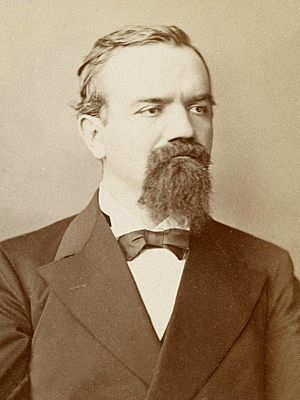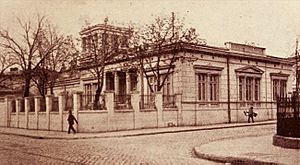Titu Maiorescu facts for kids
Quick facts for kids
Titu Maiorescu
|
|
|---|---|

Titu Maiorescu in 1882
|
|
| Prime Minister of Romania | |
| In office 28 March 1912 – 31 December 1913 |
|
| Monarch | Carol I |
| Preceded by | Petre P. Carp |
| Succeeded by | Ion I. C. Brătianu |
| Minister of Foreign Affairs | |
| In office 29 December 1910 – 4 January 1914 |
|
| Preceded by | Alexandru Djuvara |
| Succeeded by | Emanoil Porumbaru |
| Personal details | |
| Born | 15 February 1840 Craiova, Wallachia |
| Died | 18 June 1917 (aged 77) Bucharest, Romania |
| Nationality | Romanian |
| Political party | Conservative Party |
Titu Liviu Maiorescu (15 February 1840 – 18 June 1917) was an important Romanian literary critic and politician. He founded the Junimea Society, a group that helped shape Romanian culture. As a critic, he played a big part in developing Romanian culture in the late 1800s.
He was a member of the Conservative Party. He served as Foreign Minister from 1910 to 1914. He was also the Prime Minister of Romania from 1912 to 1913. Titu Maiorescu represented Romania at the Peace Conference in Bucharest. This conference ended the Second Balkan War. In both politics and culture, he preferred Germany over France. He did not want Romania to join World War I against Germany. However, he refused to work with the German army after they took over Bucharest.
Contents
Biography of Titu Maiorescu
Titu Liviu Maiorescu was born in Craiova, Romania, on February 15, 1840. His mother, Maria Popazu, was the sister of a scholar and bishop named Ioan Popazu. His father, Ioan Maiorescu, was a teacher and a very bright person. He helped create the modern Romanian education system.
During the Revolution of 1848, his father worked with revolutionaries. Meanwhile, his family, including Titu, traveled to different cities. They stayed in Brașov for a long time. There, Titu attended the Romanian gymnasium. Later, his father wrote articles about Romania in Austrian newspapers. After Romania's Union, his father held important positions in education.
Early Life and Education
Between 1846 and 1848, Titu Maiorescu went to primary school in Craiova. During the 1848 revolution, his family moved around. They went to Bucharest, Brașov, and Sibiu. In December 1848, Titu's family arrived in Blaj and then in Braşov. He continued primary school there until 1850.
From 1850 to 1851, Titu Maiorescu attended the Romanian Gymnasium in Schei-Braşov. This school was started by his uncle, Ioan Popazu. He met the famous writer Anton Pann there. This meeting left a lasting impression on him.
Studies in Vienna
In September 1851, the Maiorescu family moved to Vienna. His father was working for the Ministry of Justice. Titu Maiorescu then attended the Academic Gymnasium. This school was part of the Theresianum Academy.
While in Vienna, Maiorescu started writing his "Daily Journal." He kept this journal until the end of his life. These notes help us understand his personality. In 1858, he graduated first in his class from the Theresianum Academy. This showed his hard work and strong will.
University Studies and Early Career
Titu Maiorescu was very eager to continue his studies. He earned his PhD in philosophy in Giessen, Germany, with high honors. He then got his license in Philology and Philosophy from the Sorbonne in Paris. A year later, he also earned a law degree from the University of Paris. These studies gave him a very strong education.
In 1857, he tried to publish some translations in a newspaper. In 1858, besides his studies, he taught psychology and French privately. He taught the children of Georg Kremnitz, including Klara, who would later become his wife.
Doctorate and Philosophy
In December 1860, he received his Philology and Philosophy license from the Sorbonne. The next year, he published a philosophy essay in Berlin. This essay showed the influence of other philosophers. In December, he was granted the title of "licencé ès lettres" (Philology Licensed). He then worked on his doctorate thesis. It was about "The Relation," a new idea for philosophy. He finished this work by the end of 1861.
University Teaching Career

In the summer of 1862, Titu Maiorescu became a lawyer. He married Klara Kremnitz, his former student. In late 1862, he became a teacher at the University of Iași. He also became the principal of the Central Gymnasium in Iași.
In 1863, he taught a university course on Roman history. From February to September, he was the Dean of the Philosophy Faculty at the University of Iași. On September 18, 1863, he was elected rector (head) of the University of Iaşi for four years. He also became principal of the "Vasile Lupu" School in Iași. There, he taught pedagogy, Romanian Grammar, and Psychology. He started a "Pedagogic Practice" for students, which was new in Romania. One of his students was Ion Creangă.
In 1863, Maiorescu published a yearbook for the Iași Gymnasium. It included his essay: "Why Should the Latin Language be Studied in Gymnasium?" On March 28, his daughter, Livia, was born. She later married Dymsza and passed away in 1946. In October, he was chosen to lead the Vasilian Institute in Iași. He traveled to Berlin to study how to reorganize it. He returned to Iași in January 1864. Between 1863 and 1864, he taught philosophy at the Philology University of Iași.
Involvement in Public Life
In 1861, Titu Maiorescu gave a lecture in Berlin about French tragedy and Wagner's music. He repeated this lecture in Paris. On November 28, he earned his Law Licence in Paris. In December, he started a series of lectures on "Education Within the Family." He then returned to Romania and settled in Bucharest.
When he came back to Romania, Maiorescu wanted to help the newly formed country grow. He wanted to improve its cultural and political life. At this time, Romania needed educated people from Western universities. Maiorescu quickly rose in his career. He became a university professor at 22, a dean and rector at 23, and a member of the Romanian Academic Society at 27. He became a deputy at 30 and a minister at 34. His path was not always easy. He faced false accusations in 1864 and was suspended from his roles. However, he was cleared of all charges the next year.
Founding the Junimea Society
The 1860s were important for Maiorescu. He gave many public lectures on various topics. This was also the time when he founded the Junimea Society. He started it with his friends I. Negruzzi, Petre P. Carp, V. Pogor, and Th.Rosetti. He began working as a lawyer. Then he became principal of the "Vasile Lupu" School in Iași. In 1867, he founded the literary magazine Convorbiri Literare.
After the Union of 1859, Romania was growing. Maiorescu and the Junimea generation had new ideas for Romanian social and cultural life. Maiorescu believed in slow, natural progress. He was against "forms without root." This meant he criticized adopting Western institutions without them fitting Romanian culture. He wrote about this in his 1868 article, Against nowadays direction in Romanian culture.
Work as a Literary Critic
Maiorescu's work as a literary critic was different from earlier critics. Before 1848, there was a strong need for original Romanian literature. By the 1860s, there were many poets and writers. However, many of them lacked strong artistic skills. Maiorescu felt it was time to choose the truly valuable works. He used specific aesthetic criteria to do this.
His critics sometimes called his work "judicial criticism." This was because his studies often gave clear judgments, either positive or negative. These judgments were based on his wide knowledge and strong artistic taste. Maiorescu believed this clear criticism was needed at a time when many different works were being published. He thought that later, as great writers emerged, the public's taste would improve.
Maiorescu worked as a "tutor" or guide for writers throughout his life. He balanced this with his political career, university teaching, and law practice. He became prime minister, but this caused him to lose a friend, P.P. Carp. As a professor, he supported talented students like C. Rădulescu-Motru.
Some people criticized Maiorescu for not writing more literary works himself. However, his work as a critic greatly influenced Romanian literature. He helped promote famous writers like Eminescu, Creangă, Caragiale, Slavici, and Duiliu Zamfirescu.
People sometimes described Maiorescu as cold or unemotional. For example, the historian N. Iorga said, "Nobody was warm or cold beside him." However, Maiorescu was very generous. He quietly helped writers in the Junimea group and his students. He even helped his opponent, Dobrogeanu-Gherea. When Eminescu was ill and worried about paying for his care, Maiorescu wrote him a kind letter. He assured Eminescu that his friends were helping him. This showed Maiorescu's admirable kindness and care for others.
See also
 In Spanish: Titu Maiorescu para niños
In Spanish: Titu Maiorescu para niños
- Titu Maiorescu (main article)
- Junimea
 | Chris Smalls |
 | Fred Hampton |
 | Ralph Abernathy |

